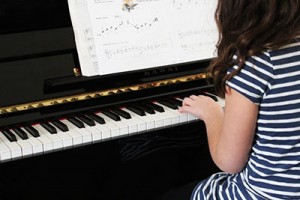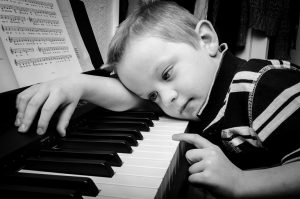I have heard this question many times, and in most cases, I feel that the best age to begin piano lessons is age 5-6 (or later). Most children in the 5-8 year old range could make excellent beginner piano students.
Of course, there are always exceptions. I have taught 4-year-olds with exceptional discipline and talent beyond that of some 10-year-old students. And there are talented youngsters on YouTube who show off incredible skill. Even so, let me share with you why it is best to be at least 5 years old:
Hand Size
Children have small hands, and small hands may be dwarfed by the piano keys. If your child’s hands aren’t yet large enough to comfortably place all five fingers on five adjacent white keys, it will be harder for them to play piano. It can also limit their progress because they won’t be able to reach certain intervals. I have had to modify sheet music or avoid selected pieces for some young students because their hands are too small, and while it’s great to see their skill level improving so quickly, it’s a little sad that their progress in some areas has to wait on their biology.
Most children ages 5 and up, unless they are very small for their age, should have large enough hands to start piano lessons. Their playability and skill level will increase as their hand size increases. Actually, starting around age 5-8 may help children train their hands and fingers to stretch so that they will end up having a bigger handspan as adults. I have seen many young pianists (like myself, once upon a time!) successfully improve the flexibility and reach of their hands by progressively trying to reach larger and larger intervals.
 Reading Skills
Reading Skills
Suzuki and other ear-based training methods can be hugely successful. You can learn how to play piano by ear without being able to read music…but you’ll be limited. I believe strongly in the value of learning to read music so that one day, with enough skill and experience, you’ll be able to pick up virtually any piece of music and be able to read and play it. Reading music is like learning a new language, and having an understanding of reading makes it so much easier. Children who know their alphabets well and who can read at least fairly comfortably are in a much better position to learn to read music.
Interest
Many young children want to learn music, but that interest may be fleeting or contextual. They hear a pretty song and want to play music like that, but then the next minute they see a fish and all they want is to be a mermaid. In most cases, by age 5 their interests tend to be more consistent. At any rate, if your child is showing a genuine interest, or if you have been fostering an interest in music from a young age, your child may be ready to learn.
Dexterity
Finger dexterity is an obvious requirement for piano. However, this can be learned. As long as your child’s fingers are able to respond independently, even with difficulty, they can be trained with piano lessons.
 Discipline/Attention Span
Discipline/Attention Span
For formal piano lessons, you have to sit for 30+ minutes and be focused and disciplined. You have to listen to the teacher, respond, and not get off track. This discipline has to carry over into practice time at home. Most children who haven’t had formal education (i.e. preschool or kindergarten) aren’t prepared for this, and that can turn what could have been a wonderful learning experience into a frustratingly negative one. It’s better to wait until your child is ready to focus and at least learn to be disciplined.
What if my child is older than that?
It is never too late to start piano lessons! Piano students can begin at age 6, 7, 8, 10, 15, 25, 65… For children, some of my best young beginner students have been 6, 7, and 8 years old. These age groups are young and eager to learn, but are quicker on the uptake and more prepared to internalize the material than much younger ones. (Their hands are also usually bigger and more dexterous, which definitely makes playing easier.) I’ve also had great success working with teens and adults of all ages.
The truth is, for those who fit the above measures, the best time to begin piano lessons is as soon as possible! Piano lessons are a great opportunity to develop a skill that will benefit your mind, body, and spirit and will enrich your life for years to come.
